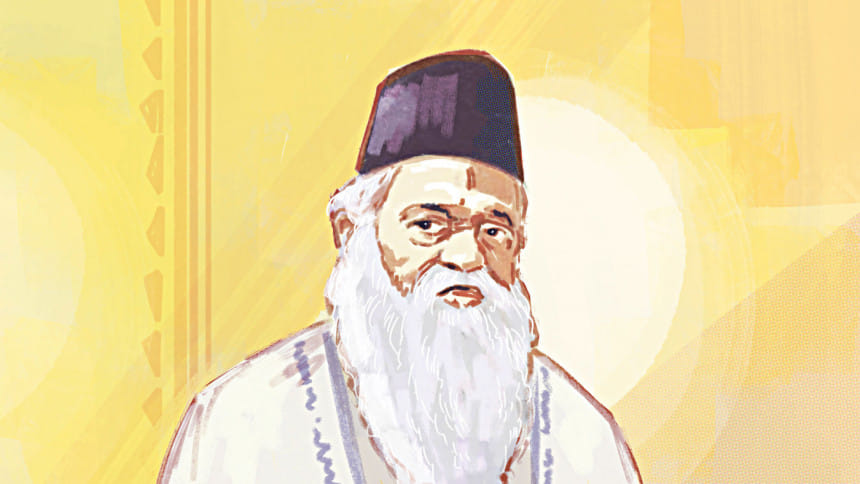Dr Shahidullah’s thoughts on India and Pakistan’s language problem

Even before the partition of India, the question of language was an issue of debate, which eventually turned into an acute dilemma for both Pakistan and India. Against this backdrop, Dr Muhammad Shahidullah actively delved into the discussion of language, a key component of state formation and mechanism. His intervention in this subject, to this day, remains remarkable.
It is a well-known fact that when Dr Ziauddin Ahmad, the former vice chancellor of Aligarh University, proposed Urdu as the state language for Pakistan in July 1947, Shahuidullah instantly protested. At that time, Shahidullah was serving as the principal of Bogra Azizul Haque College after retiring from Dhaka University in 1944. It was not as such that he was against Urdu in his famous article of 1947, when Pakistan was yet to turn into an independent state, but rather his position was against assigning Urdu as the sole state language of Pakistan.
He argued it would be a mere replication of India, as Congress was pushing for Hindi as the only state language. He posited that Dr Ziauddin's cherished dream of Urdu being ensured and secured for the medium of instruction in learning, neglecting regional languages, is not only unscientific but would surely be a move that contradicts with the spirit of provincial autonomy and right of self-determination.
Shahidullah additionally stated that Urdu was not a vernacular language in any province of Pakistan like English, although the colonial master of England would be insignificant in independent Pakistan. Nonetheless, English would continue to remain important as it is an international language, containing the expressions of speculative thinking and scientific experiments. Thus, he suggested that it would be a wise decision for English to be made a state language both in India and Pakistan. Moreover, he argued for Bangla, as it had already garnered global recognition as a literary language, citing the sizable Bangla-speaking community, which ranks as the seventh largest in the world.
Shahidullah highlighted that if any language is to be made the second state language of Pakistan, after Bangla, it could be Urdu. Additionally, he mentioned the example of placing multiple languages like what Canada, Belgium, or Switzerland have done, not entertaining any single one as the state language.
In 1920 at Shantiniketan, Shahidullah delivered an insightful lecture where Rabindranath Tagore presided over the event. The problem of Indian languages was the central theme of his lecture: he pointed out that overcoming the limits of being "many races" was needed for the Indian nation. He extensively discussed that the strength of any language mainly depends on state patronisation, religion, literature, and business. The penetration of English in this subcontinent was seen to be too overwhelming due to the sponsorship of the British emperor. Furthermore, English gained its international acceptance as a medium of critical thinking for a long while. Besides, he mentioned that English proved its strength through businesses.
Except in the realm of religion, Shahidullah hinted English vehemently entered every sphere of the educated minds, encompassing literary imagination and political aspirations as well. Needless to mention, Sanskrit and Arabic achieved the esteem of religious languages by Hindus and Muslims. Subsequently, he spoke about Bangla, which emerged in the Buddhist period, received patronisation from the Muslim rulers, and developed as a great literary language in the British colonial time.
However, he mentioned that most people remained illiterate in the last phase of colonial times, thus the challenge of learning any other language had been so acute. Therefore, he was examining the potential of all the languages of India to become the most common language, which would not replace or dominate any other regional language and rather would work as a common lingua franca.
Hindustani was one of the most colloquial languages, but unfortunately, it witnessed a separation through its Hindu and Muslim users, as Hindi and Urdu emerged following the adoption of different scripts and the power of borrowing vocabularies. He argued that initially, the breach between these two groups appeared negotiable. However, the rivalries between them escalated to a point of no return, extinguishing any lingering ray of hope for reconciliation.
Nevertheless, according to Shahidullah, if English, as a foreign language, was not granted to take the role of the common language in this continent, Urdu undoubtedly had more prospects of becoming the common language of India. After Urdu, he deemed Bangla to be the next, while Hindi remained later on the list. Paradoxically, Shahidullah, one of the most renowned linguists in both India and Pakistan, opined Bangla should be given the first priority to become the state language of Pakistan despite Urdu existing as the most common language of undivided India.
Priyam Pritim Paul is a researcher.

 For all latest news, follow The Daily Star's Google News channel.
For all latest news, follow The Daily Star's Google News channel. 





Comments